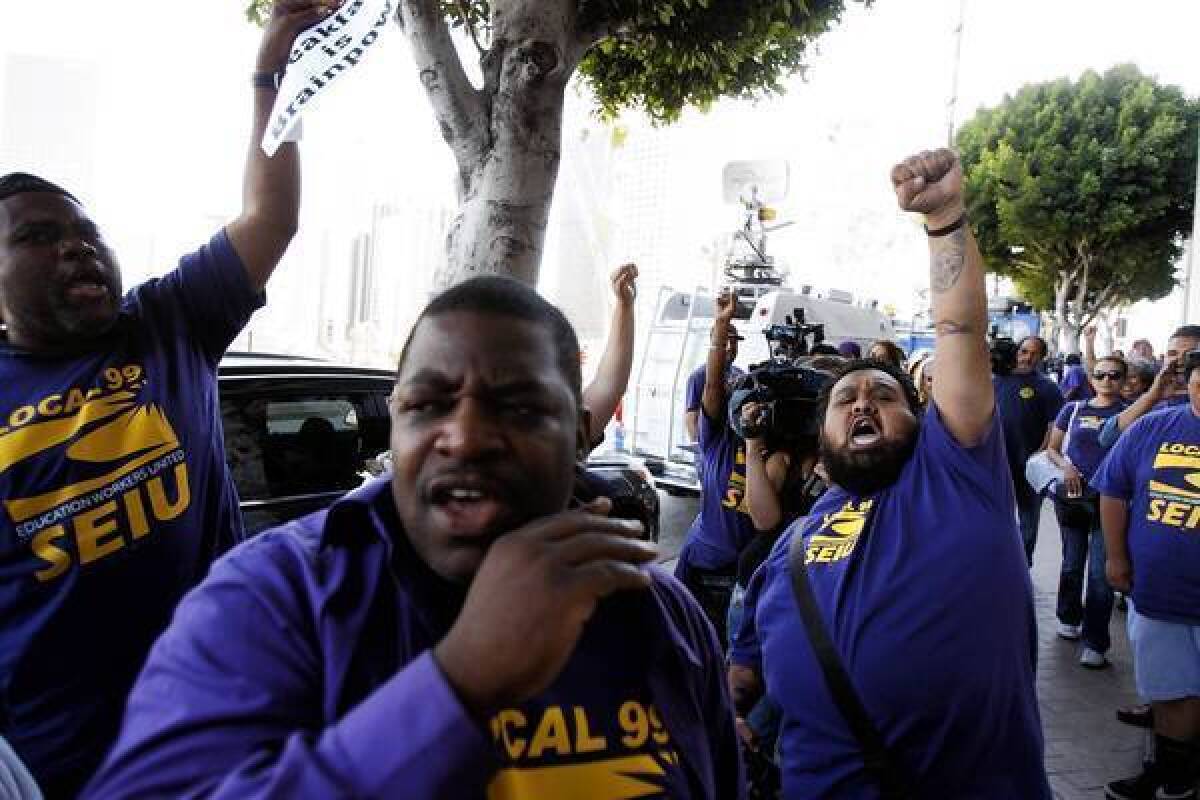L.A. school board keeps classroom breakfast program

- Share via
As Gov. Jerry Brown announced more funding for public schools Tuesday, the Los Angeles Board of Education agreed to pay for more school police, maintain a classroom breakfast program and keep supplemental staff at schools.
The board also heard projections of next school year’s budget, which — for the first time in six years — wasn’t expected to require any new cuts.
L.A. Unified schools Supt. John Deasy had asked the seven-member board to approve the so-called discretionary programs, although it was unclear whether they would all be funded directly from the district’s general fund.
Although Brown’s budget designated $1.6 billion more for schools than anticipated in January, most of that money — about $1 billion — would be used for districts to implement new state academic standards. The governor also is proposing to give more money to districts that serve large numbers of low-income students while allowing them more flexibility in how they spend state dollars.
But L.A. Unified’s chief financial officer, Megan Reilly, said the district’s financial picture still is “precarious.”
“We are relying on one-time funds to support enormous labor force and programs,” Reilly said.
Meanwhile, hundreds of teachers union members rallied outside L.A. Unified headquarters, calling for smaller class sizes, fully staffed schools and the restoration of vital services that would come from Proposition 30 funding. That measure, approved by voters in November, provides more money to public schools and colleges.
Union leaders said any additional funding should be used to reduce class sizes and rehire teachers dismissed because of previous budget reductions.
The breakfast program, which feeds more than 2,000 students in about 290 schools across the L.A. Unified School District, passed unanimously, with high-profile support from union workers, parents and mayoral candidate Wendy Greuel.
Two of the district’s most influential labor unions previously were at odds about the early morning meals, but both agreed that the program was beneficial to students as long as accommodations were made to ease teachers’ concerns.
In a recent survey, members of United Teachers Los Angeles said they would support eliminating the program if such issues as food messes and interrupted instructional time were not addressed. But board member Steve Zimmer said it’s the district’s obligation to work out the problems.
“Every program I’ve seen LAUSD implement has problems,” Zimmer said. “We know we cannot turn away and pretend for a moment longer that [hunger] is someone else’s problem. This is not instead of education. This is education.”
District officials also cited increased participation and funding as reasons to maintain the program.
“When breakfast was served in the school cafeteria, we had a 29% participation rate. That has increased by 89% since breakfast in the classroom and, best of all, students are eating a healthy, nutritious breakfast,” said David Binkle, the district’s food services director.
The program’s expansion will bring in about $20 million in federal funding to pay for the food, jobs and custodial services by the third year of its implementation.
The board also approved a $4.2-million budget increase to the L.A. School Police Department, a move that would allow the district to hire school police officers and receive more police resources. School district police Chief Steve Zipperman said his department received a similar budget increase last July, but it was used to “recover from the deficiency we had.”
Zipperman said his budget had remained static since 2006, even though the district has opened 96 schools since then.
The move didn’t please some groups, who said the money could have been spent on more preventive positions, such as counselors and support staff.
“For too long, we’ve heard that we need more armed guards to make schools safer,” said Community Rights Campaign spokesman Manuel Criollo in a statement. “That argument has exhausted itself by showing that it leads not to increased school safety but instead to a pre-prison school climate.”
Tuesday’s lengthy board meeting was packed with supporters and opponents. Some attendees began lining up for seats at 6 a.m. for the 1 p.m. meeting. At one point, UTLA’s red-shirted members were competing for street space with blue-clad students rallying against suspensions for “willful defiance.”
The board also approved the transformation of Weigand Avenue Elementary School under the controversial parent trigger law. On a 5-2 vote, the board accepted a petition to transform Weigand by removing the principal, Irma Cobian.
The majority of Weigand students, who are low-income and still learning English, are below grade level in both reading and math. Parents representing 61% of students signed a petition asking for new leadership earlier this year.
They were assisted by Parent Revolution, the Los Angeles nonprofit that pushed the 2010 parent trigger law. That law allows parents at low-performing schools to petition to replace staff, change curriculum, close the campus or convert to a publicly funded, independent charter.
Some parents told the board that petition proponents misled them, saying they signed because they were told only that their support would “improve the school,” not remove the principal. But Llury Garcia, a Weigand parent who led the petition campaign, said “we told them the truth” and that new leadership was needed because Cobian had failed to improve the academic performance of students.
More to Read
Sign up for Essential California
The most important California stories and recommendations in your inbox every morning.
You may occasionally receive promotional content from the Los Angeles Times.











